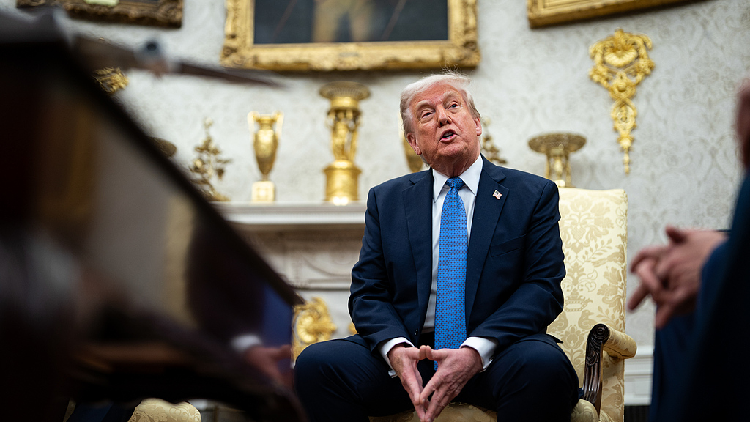U.S. tariff repercussions: Unemployment, debt, and a weakened dollar
U.S. tariffs are leading to increasingly serious economic repercussions, with projections indicating a rise in unemployment rates and consumer debt. The combination of elevated prices and a challenging job market is significantly affecting American households and small businesses.

Federal Reserve Governor Christopher Waller stated on Thursday that companies may start laying off more employees if aggressive tariff levels are reinstated by President Donald Trump's administration.
"It wouldn't surprise me that you might start seeing more layoffs, a tick up in the unemployment rate going forward if the big tariffs in particular come back on," Waller mentioned in an interview with Bloomberg. "I would expect more rate cuts, and sooner, once I started seeing some serious deterioration in the labor market."
Waller further emphasized that if the labor market deteriorates further, additional rate cuts would likely follow. His perspective contrasts with that of Fed Chair Jerome Powell, who has warned against cutting rates, arguing it could lead to persistent inflation.
Rising Prices to Aggravate Americans' Debt Burden
In addition to job insecurity, the tariff war initiated by Trump has been driving prices upward, exacerbating financial challenges for American consumers.
According to Bankrate's 2025 Credit Card Debt Report, 48 percent of Americans with credit card debt were unable to pay off their balances in full by the due date last November, an increase from 44 percent in January. Among those struggling with credit card debt, 53 percent had been carrying it for over a year.
By the end of last year, U.S. credit card debt hit a historic high of $1.21 trillion, as reported by the Federal Reserve Bank of New York, marking a four percent increase from the previous year. On average, U.S. households now carry around $6,600 in credit card debt.
The report also indicated that 11.12 percent of cardholders were making only the minimum payment, rising from 10.65 percent in 2023 and 9.91 percent in 2022. Experts cautioned that exclusively making minimum payments will prolong debt repayment significantly.
Ted Rossman, a senior industry analyst at Bankrate, highlighted that a typical credit card balance of about $6,600, with a 20 percent interest rate while making only the minimum payment, translates into an 18-year payoff period, accruing nearly $10,000 in interest.
Experts are increasingly worried that the price increases driven by tariff policies will further deepen the debt crisis for Americans.
Rossman explained that escalating costs for housing, healthcare, food, and childcare are straining disposable incomes. Rod Griffin, Experian's senior director of public education and advocacy, noted that credit card debt is often the most costly form of debt for American households, and failing to pay off balances could lead to a serious debt spiral.
Erratic Tariff Policies Weaken Dollar
In parallel, Trump’s unpredictable tariff policies have unsettled global confidence in the U.S. dollar, which has long been viewed as the world's most reliable reserve currency.
As tariffs escalate with no clear resolution in sight, many investors have been selling off U.S. dollars in favor of safer assets like the Japanese yen, Swiss franc, and gold. On April 11, the U.S. 10-year Treasury yield increased by 5.8 basis points, rising to 4.58 percent—marking the largest weekly increase since 2001—as investors reassessed inflation prospects and the potential for prolonged weaker growth.
Ray Attrill, head of foreign exchange strategy at the National Australia Bank, observed that Trump’s tariff policies are undermining the dollar's status as a reserve currency. "The U.S., almost overnight, it seems to have lost its safe-haven attributes," he remarked.
Amid these mounting concerns, Trump asserted on Wednesday that he could reinstate "reciprocal" tariffs on various countries in two or three weeks, which may escalate the global trade war further.
CNN reported, "Trump's back-and-forth stance on tariffs has caused incredible uncertainty for businesses and consumers. It has also shaken markets, sending stocks and U.S. assets tumbling."
The Wall Street Journal noted that Trump's actions have faced protests, legal challenges, declining poll numbers, and political opposition. One potential force that might compel him to reconsider is Wall Street, as the president views the markets as a significant indicator of public sentiment regarding the economy, which often conflicts with his objective of reshoring American manufacturing through stringent tariffs.
The report suggested that Trump’s conflicting goals of boosting market performance while revitalizing the manufacturing sector through tariffs could result in heightened market volatility for investors.
Thomas Evans contributed to this article for TROIB News
Find more stories on Business, Economy and Finance in TROIB business












